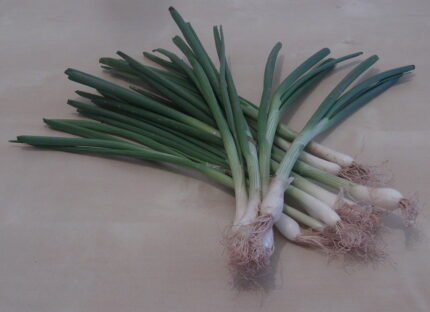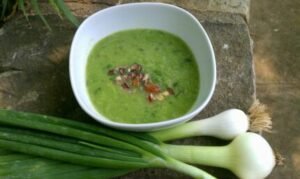Medically reviewed by Dr. Ramesh Gaddam, M.D. — Written by Sumalatha, D.N.H.E
1. Spring Onions Nutrition
Nutritional profile of spring onions (per 100 grams):
| Nutrient | Amount per 100g |
|---|---|
| Calories | 32 kcal |
| Carbohydrates | 7.34 g |
| Sugars | 2.34 g |
| Fiber | 2.6 g |
| Protein | 1.83 g |
| Fat | 0.2 g |
| Vitamin C | 13.2 mg (22% DV) |
| Vitamin A | 997 IU (20% DV) |
| Vitamin K | 207 µg (258% DV) |
| Folate (B9) | 64 µg (16% DV) |
| Calcium | 72 mg (7% DV) |
| Potassium | 276 mg (8% DV) |
| Iron | 1.48 mg (8% DV) |
| Magnesium | 20 mg (5% DV) |
2. Spring Onion Benefits
Spring onions, also known as green onions or scallions, offer several health benefits:
Boosts Immunity
Spring onions are rich in vitamin C, which helps the body fight infections.
They can support your immune system, making it easier to stay healthy.
Regularly eating spring onions may help your body defend against common colds and flu.
Supports Heart Health
The antioxidants in spring onions may help keep your heart healthy.
These compounds can reduce inflammation, lowering the risk of heart disease.
Adding spring onions to your diet can be an easy way to support your heart.
Promotes Digestive Health
Spring onions contain fiber, which supports a healthy digestive system.
Fiber helps prevent constipation and keeps your gut working well.
Including spring onions in your meals can make digestion smoother and more comfortable.
Helps with Weight Management
Low in calories and packed with nutrients, spring onions can be a smart choice for weight control.
They add flavor without adding extra calories, making meals more satisfying.
Including spring onions in your diet can help you stay on track with healthy eating goals.
Enhances Bone Strength
Spring onions contain vitamin K, which is important for strong bones.
This vitamin helps your body absorb calcium, which keeps your bones healthy and strong.
Regular consumption of spring onions may lower the risk of bone-related issues as you age.
Improves Eye Health
With a good amount of vitamin A, spring onions are beneficial for eye health.
Vitamin A supports clear vision and may help prevent eye problems like dry eyes.
Including spring onions in your diet can help maintain sharp vision over time.
Fights Inflammation
Spring onions are packed with antioxidants that may help reduce inflammation in the body.
This can protect against certain chronic diseases linked to inflammation.
Eating spring onions regularly may help manage inflammation and improve overall well-being.
3. Spring Onion Side Effects
While spring onions are generally considered safe to consume and offer several health benefits, there are a few potential side effects or considerations to keep in mind:
Digestive Distress:
Some people may experience digestive discomfort, such as gas or bloating, when consuming spring onions, particularly if they are sensitive to high-fiber foods.
To minimize this, start with smaller amounts and gradually increase your intake.
Allergies:
Individuals with allergies to allium vegetables, which include onions and garlic, may also be sensitive to spring onions.
Allergic reactions can range from mild to severe and may include symptoms like skin rashes, itching, or digestive upset.
If you suspect an allergy, it’s best to avoid spring onions.
Medication Interactions:
Spring onions contain vitamin K, which plays a role in blood clotting.
If you are taking blood-thinning medications, it’s important to maintain a consistent intake of vitamin K.
Speak with your healthcare provider about managing your vitamin K intake, including spring onions, while on such medications.
Gastroesophageal Reflux (GERD):
If you have gastroesophageal reflux disease (GERD), the mild onion flavor in spring onions may trigger acid reflux symptoms in some individuals.
It’s advisable to monitor your personal tolerance and adjust your consumption accordingly.
Contaminants:
Like other fresh produce, spring onions may carry contaminants such as pesticide residues or bacteria.
It’s essential to wash them thoroughly before consumption.
If you are concerned about pesticide residues, consider buying organic spring onions.
Blood Pressure:
The potassium content in spring onions can be beneficial for most people, but individuals with kidney problems or those on potassium-restricted diets should monitor their intake.
Excessive potassium intake can be harmful in certain medical conditions.
Oxalates:
Spring onions, like some other vegetables, contain oxalates.
High intake of oxalates may contribute to the formation of kidney stones in susceptible individuals.
If you are prone to kidney stones, you might want to moderate your consumption of foods high in oxalates, including spring onions.
4. Spring Onion Uses
Salads
Add chopped spring onions to your salads for a mild onion flavor and a refreshing crunch. They also make an excellent garnish.
Garnish
Use finely chopped spring onions as a garnish for soups, stews, chili, baked potatoes, and various savory dishes. They add a pop of color and a mild oniony flavor.
Stir-Fries
Spring onions are a popular ingredient in Asian stir-fry dishes. Cut them into small pieces and toss them into your stir-fry for a burst of flavor and a slight crunch.
Grilling
Brush whole spring onions with oil and grill them until they’re tender and slightly charred.
Grilled spring onions make a tasty side dish or accompaniment to grilled meats.
Omelets and Scrambled Eggs
Add chopped spring onions to your morning eggs for an extra layer of flavor and a touch of freshness.
Salsas
Chopped spring onions can be used in fresh salsas to provide a mild onion flavor and a bit of texture.
Dips and Dressings
Incorporate chopped spring onions into dips, dressings, and sauces to give them a mild, oniony kick.
Potato Dishes
Mix spring onions into mashed potatoes, potato salad, or potato-based casseroles for a tasty twist.
Baked Goods
Use spring onions as an ingredient in savory baked goods, such as biscuits, savory muffins, or scones.
Pickling
Spring onions can be pickled to extend their shelf life and provide a tangy and mildly onion-flavored condiment.
Sautéing and Gravy
Sauté spring onions along with other vegetables as a base for soups, sauces, and gravies.
Noodle Dishes
Sprinkle chopped spring onions on top of noodle dishes, such as ramen or chow mein, to enhance their flavor.
Sandwiches and Wraps
Include sliced spring onions in your sandwiches and wraps for an added layer of flavor and texture.
Dips
Puree spring onions with other ingredients to create a creamy spring onion dip or spread.
Casseroles
Add chopped spring onions to various casseroles for an extra layer of flavor.
5. Spring Onion calories
The calorie content of spring onions primarily depends on the serving size and how they are prepared.
Here’s an approximate calorie count for different parts of spring onions:
- 1 cup (about 100 grams) of raw chopped spring onions: Approximately 32 calories
- 1 medium-sized spring onion (about 25 grams): Approximately 8 calories
Is spring onion good for stomach? Is Spring Onion hard to digest?
The fiber content in spring onions can support healthy digestion by promoting regular bowel movements.
It can help prevent constipation and maintain a healthy digestive system.
Some compounds in spring onions may have anti-inflammatory properties, which can help reduce inflammation in the digestive tract and support overall stomach health.
Does spring onions cause gas?
Spring onions are less likely to cause excessive gas or bloating compared to mature onions.
Their milder taste is often better tolerated by those with gas-related concerns.
Does spring onions cause acidity?
Spring onions, with their mild flavor, are less likely to trigger heartburn or acid reflux compared to stronger onions, making them a better choice for individuals with sensitive stomachs.
The milder flavor of spring onions is less likely to irritate the stomach lining, making them a suitable choice for individuals with a history of stomach ulcers.
What is the best time to eat onion?
The best time to eat spring onions, like many vegetables, is as part of a balanced meal.
Including them in salads, stir-fries, omelets, or as a garnish for various dishes can help you enjoy their mild flavor and potential health benefits while maintaining a balanced diet.
Is spring onion better cooked or raw?
Is it OK to eat green onions raw?
Eating green onions (spring onions) raw in a salad is perfectly safe and can add a delightful crunch and mild onion flavor to your salad.
Many people enjoy the fresh taste and texture of raw green onions in salads.
Is healthy to eat raw green onions?
Eating raw green onions can be a healthy choice, as they provide essential nutrients and are low in calories.
However, if you have a sensitive stomach or digestive issues, consuming large quantities of raw onions, including green onions, may cause discomfort, gas, or bloating in some individuals.
It’s a good idea to start with a small amount and observe how your body reacts.
Who should not eat raw onion?
Individuals with irritable bowel syndrome (IBS) or other gastrointestinal sensitivities may find that raw onions, including green onions, can exacerbate their symptoms.
Why eat raw onions everyday?
Eating raw onions every day is not necessary for most people.
While onions, including spring onions, offer health benefits, it’s important to maintain a balanced diet that includes a variety of foods to ensure you receive a wide range of nutrients.
Some people enjoy the flavor and health benefits of raw onions and may incorporate them into their daily diet, but it’s not a requirement for good health.
Spring onions in different Indian languages:
- Hindi: In Hindi, spring onions are known as “हरा प्याज” (hara pyaj) or simply “प्याज” (pyaj).
- Bengali: In Bengali, they are called “পেঁয়াজ” (peyaj).
- Tamil: In Tamil, spring onions are known as “வெங்காயம்” (vengayam).
- Telugu: In Telugu, they are referred to as “ఉల్లిపాయ” (ullipayi).
- Marathi: In Marathi, spring onions are called “पाचकडी” (pachakdi).
- Kannada: In Kannada, they are known as “ಹಸಿರು ಈರುಳಿ” (hasiru eeruli).
- Malayalam: In Malayalam, they are referred to as “ഉള്ളി” (ulli).
- Gujarati: In Gujarati, spring onions are known as “લીલું કાંદો” (leelu kando).
These names may vary slightly depending on regional dialects and preferences. Spring onions are commonly used in various Indian cuisines to add flavor and texture to dishes.
References
[1] https://www.slurrp.com/article/7-health-benefits-of-eating-spring-onion-1708691866965
[2] https://toneop.com/blog/11-Amazing-Benefits-Of-Spring-Onions
[3] https://bebodywise.com/blog/spring-onion-benefits/
[4] https://indianexpress.com/article/lifestyle/food-wine/nutrition-alert-spring-onions-health-benefits-9030513/
[5] https://www.truemeds.in/blog/10-spring-onion-benefits
[6] https://www.ncbi.nlm.nih.gov/pmc/articles/PMC10742967/
[7] https://www.webmd.com/food-recipes/scallions-health-benefits
[8] https://www.netmeds.com/health-library/post/spring-onion-scallion-health-benefits-nutrition-values-recipes-and-side-effects
Also Read:
Medically reviewed by Dr. Ramesh Gaddam, M.D.

General Physician, Diabetologist, and Critical Care Specialist.
Discover more from Health Build-Up
Subscribe to get the latest posts sent to your email.










